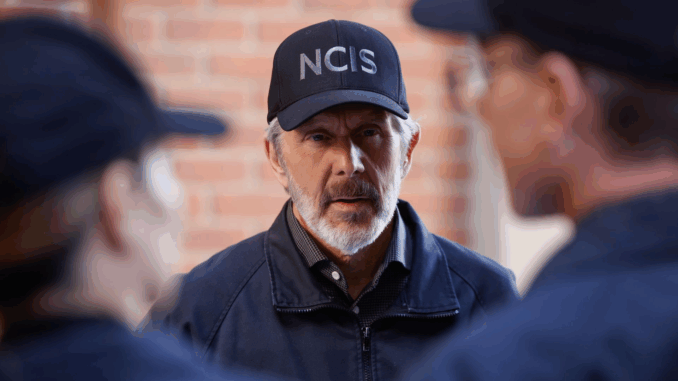
The Quiet Predator: Revisiting Mark Harmon’s Chilling Performance as Ted Bundy
For over two decades, Mark Harmon was the face of one of television’s most enduring characters: Special Agent Leroy Jethro Gibbs. With his stoic demeanor, unflinching moral code, and signature head slap, Harmon’s portrayal of Gibbs in NCIS became a cultural touchstone. He was the embodiment of a strong, silent hero, a man you could always count on to get the job done, no matter the cost.
But long before he was a hero to millions of viewers, Mark Harmon took on a role that was the complete antithesis of Gibbs. Seventeen years before NCIS premiered, Harmon delivered a career-defining performance as one of America’s most infamous and chilling serial killers, Ted Bundy, in the 1986 miniseries The Deliberate Stranger.
This two-part, made-for-television film, based on the book by reporter Richard W. Larsen, has largely been forgotten by modern audiences, overshadowed by the countless true-crime documentaries and dramatic retellings that have emerged in the years since. Yet, for those who saw it, Harmon’s portrayal was nothing short of brilliant—a performance so unsettling and accurate that it earned him a Golden Globe nomination and the chilling praise of Bundy’s own defense lawyer.
A Star Is Reborn: Harmon’s Career at a Crossroads
In the mid-1980s, Mark Harmon was a recognizable face, but he was far from the television icon he would become. He had a few notable roles under his belt, including a stint on the medical drama St. Elsewhere that had just ended. The role of Ted Bundy was a significant gamble for him. Bundy was a deeply complex figure, a man who charmed his victims and the public with his good looks and seemingly normal demeanor, all while hiding a monstrous, predatory nature. Capturing that duality—the charming law student on the outside and the cold-blooded killer on the inside—was no easy task.
Harmon didn’t just play Bundy; he transformed into him. He adopted Bundy’s mannerisms, from his rigid posture to his slightly suspicious expression. The film wisely chose not to focus on the gruesome details of the murders, which were network-appropriate for the time. Instead, it centered on the psychological profile of the killer and the tireless work of the investigators who hunted him down. This approach allowed Harmon’s performance to shine. He didn’t rely on jump scares or special effects; he used his subtle acting to convey the deep-seated menace lurking beneath the surface.
The miniseries followed Bundy’s crimes from the murder of Georgann Hawkins through his subsequent killings across Washington, Utah, and Florida. It also chronicled his audacious two escapes from police custody. The film’s strength lay in its refusal to sensationalize the violence, instead building a taut, suspenseful atmosphere that was genuinely terrifying. The horror came not from what you saw, but from what you knew was happening, and the terrifying realization that this charismatic man could be a monster.
The Chilling Seal of Approval
One of the most remarkable endorsements of Harmon’s performance came from an unexpected source: Polly Nelson, one of Bundy’s own defense lawyers. In her book, Defending the Devil, Nelson described the miniseries as “stunningly accurate” and praised Harmon for how he captured Bundy’s demeanor, down to his posture and facial expressions. The praise was a testament to the meticulous research and commitment Harmon brought to the role.
While others, like Ann Rule—who had worked with Bundy on a suicide hotline—felt that Harmon’s portrayal missed some of the deeper insecurities beneath Bundy’s confident facade, the overall consensus was that Harmon had delivered a powerful and unforgettable performance. He was able to convey the sheer ordinariness of the man, which was precisely what made him so dangerous. He wasn’t a cartoon villain; he was the stranger next door, a chilling reality that the miniseries masterfully exploited.
The film’s success was not just critical. It garnered strong ratings for NBC, proving that audiences were captivated by the true-crime genre even then. It became a benchmark for how to portray real-life serial killers without resorting to cheap exploitation. The 72% Rotten Tomatoes score, a rarity for a made-for-TV film from that era, further solidifies its legacy as a high-quality piece of filmmaking.
From Bundy to Gibbs: A Career-Defining Paradox
Looking back at Harmon’s career, the role of Ted Bundy serves as a fascinating paradox. It was a role that demonstrated his immense range and willingness to take on dark, complex characters. Yet, for an entire generation of viewers, he will always be the heroic, morally upright Agent Gibbs.
The quiet intensity that made Harmon so believable as a serial killer is the very same quality that he would later use to define Gibbs. The unblinking stare, the measured movements, the sense of a deep, unreadable interior life—all of these elements were honed in his portrayal of Bundy and perfected in his time on NCIS. It’s a testament to his skill that he could use the same tools to create two such diametrically opposed characters.
The Deliberate Stranger remains a crucial part of Mark Harmon’s acting history. It’s a testament to his talent that he could not only portray a character as monstrous as Ted Bundy but also manage to captivate and disturb audiences in the process. While it may be a forgotten piece of television history, it’s a must-watch for any NCIS fan curious to see the full scope of their favorite star’s remarkable career. It’s a chilling reminder that the man who played one of television’s greatest heroes once delivered a performance so powerful, it left audiences terrified of the quiet stranger who might just be living next door.